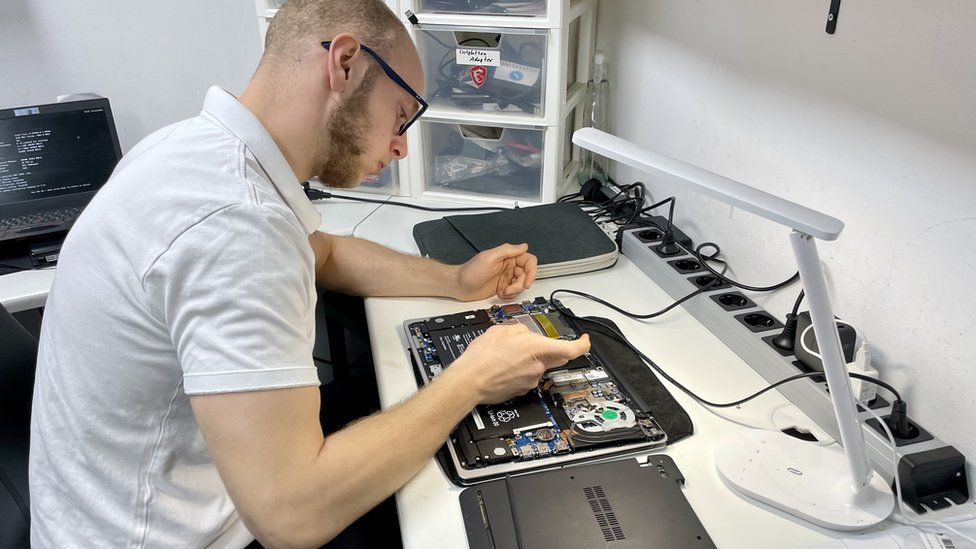ARTICLE AD BOX

Under the voucher scheme, Austria will pay up to €200 ($219; £173) to repair broken electronics
By Bethany Bell
BBC News, Vienna
Has your washing machine broken down, or is your electric kettle, laptop or mobile phone refusing to work?
Well if you live in Austria, the government will pay up to €200 ($219; £173) towards getting it repaired.
The Repair Bonus voucher scheme is aimed at trying to get people to move away from throwing away old electrical appliances - and focussing on getting things mended.
Erik's laptop is broken, so he has come to Helferline, a computer and mobile phone repair workshop in Vienna. Because of Austria's Repair Voucher scheme, he will only have to pay 50% of the repair costs to get it fixed.
"It's an old laptop, and I'm trying to make it go again, instead of buying a new one," he said.
Erik has already used the Repair Bonus to mend an old CD player, which is now working well. He says the scheme makes it easier to decide whether or not to throw something away.
"Yeah, it helps, because usually handcraft and people fixing things is much more expensive than buying a new one. This way, things can be saved."
At the back of the workshop, Lukas, a technician, checks out the motherboard of an old laptop. Around him are stacks of boxes full of computers and phones which have been brought to be mended.
BBC
Our revenues have doubled since it was introduced. So we're very happy about it
Helferline's chief executive, Clemens Schmidgruber, says the Repair Bonus scheme has been great for his business.
"Our revenues have doubled since it was introduced. So we're very happy about it," he said.
"It is a real win-win situation for customers, for local businesses and of course for the environment.
"Customers benefit because it helps them save a lot of money. Of course, it's good for local businesses because they generate additional revenues. And the environment benefits, because there's less electronic waste."
Mr Schmidgruber says customers have to download a voucher from a government website and then pay the repair shop upfront. "Then you get back half of the costs after three to four weeks."
The Austrian government's repair voucher system, which is financed through the Covid Recovery Fund, is just for electrical appliances.
But the City of Vienna runs a separate scheme - which works in a similar way and helps people pay for repairs to old clothes, bicycles or furniture.
Markus Piringer, the co-ordinator of the Repair Network in Vienna, says "if the costs of the repair are more than 20-30% of the cost of the new product, people tend to buy new. And as the Repair Bonus lowers those costs, it's a big incentive to repair more."
But he says the financial aspect of repair, while very important, is just one part of the picture.
"Another very important point is that the products have to be repairable. So, we [need to] work on this at European Union level and more effort needs to be taken to really get things going there."
Austria's capital Vienna has a separate voucher to help people repair bicycles, furniture and old clothes
Markus says it's all about changing policies and mindsets.
"For many people, it's still very positive to have always the newest product and to throw away your clothing after half a year or even less. And so this is also something where we need awareness raising."
And he warned that while the number of repairs was rising in Austria because of the voucher schemes, there were still too few technicians and craftspeople to do it. "We have a problem that we don't have enough repairers. So we also need a system which is promoting repairs as a job. We are working on this at the moment."
At his bicycle shop in Vienna, Marc Warnaar and his team are fixing a bike, which has rusted brake and gear cables.
"They don't make spare parts for this gear system," he says, "Especially the gear cables, you cannot buy them anymore. So what we'll do is exchange them with a newer model, so it will run again."
He says the Vienna Repair voucher has made a big difference to his business.
"Normally we see a large decline in repairs, especially in winter. But now we see a lot of people coming because of this voucher and getting their bikes repaired also in winter. Yeah, it's been good for us."

 1 year ago
20
1 year ago
20








 English (US) ·
English (US) ·